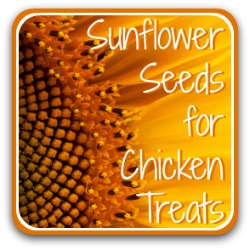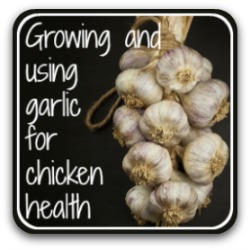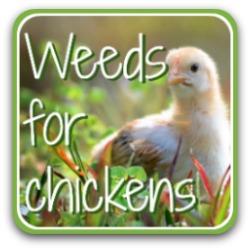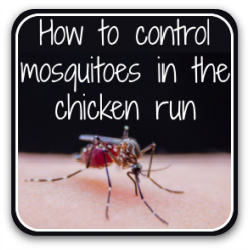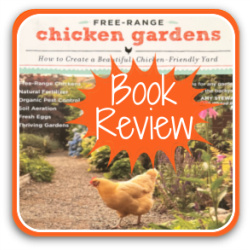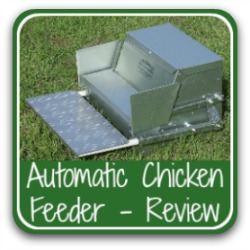- Home
- Plants for Chickens
Plants for chickens: easy to grow flowers and herbs which offer natural benefits for your flock and your garden - all year round!
If you've decided to provide your chickens with as natural an environment as possible while enhancing your garden at the same time, this is the place to be!
All the links on this page lead to different plants and herbs which have been proven to offer benefits for your flock's health and well-being.
Some are edible, others are beneficial in external use. They're presented here in alphabetical order.
Since 2006, reviewed and updated in 2016, the European Union has vastly restricted the use of antibiotics in animal feed. The aim was to limit the spread of "superbugs' which are resistant to medical treatment.
For that reason, a myriad of studies into the use of natural remedies to replace commercially produced drugs have been undertaken.
These articles are based on those studies.
So there's no guesswork here: my information is all verified from research undertaken with chickens.
You can rest easy knowing that all these plants, which will make your garden come alive with colour, are also potentially great for your chickens' health.
Want a quick summary? Watch this video of the best plants for chickens!
Section 1: Flowering Plants
A pretty, perennial garden flower, Echinacea is also a known and proven immune system booster for chickens, and a non-medical means of dealing with coccidiosis.
This articles looks at which type of Echinacea is most effective, and how best to feed it to your flock.
Not a plant the chickens will want to eat, but lavender has other beneficial uses in the chicken coop.
Use it as an anti-bacterial agent for wounds, a calming agent for anxiety after any stressful incident, and a highly effective fly and insect repellent.
It's pretty widely known that marigolds in chicken feed can turn egg yolks a beautifully deep shade of orange.
But did you know different types of marigold should be used for different purposes?
This article covers them all.
Easy to grow, happy in any type of soil no matter how poor, satisfied with very little moisture - nasturtiums are a must-have in any garden.
And the entire plant from flower to stem is an excellent source of vitamins and trace elements for your flock.
Pretty to look at, roses themselves aren't of great benefit to your chickens in summer.
But in winter, they really come into their own.
Find out why, which part of the plant to use, how to harvest it and how much to feed your flock.
The sight of acres of sunflower fields are a huge part of the joy of living in Italy.
The fact that their seeds are a great boost to our chickens' health just at the time when they need high protein foods most is an additional bonus.
Find out why, and how to grow and harvest, in this article.

Section 2: Herbs
Ten herbs for chicken health
Herbs may be good for chicken health – but which are the most beneficial, what do they help in terms of a chicken's wellbeing, and how much should they be fed, in what quantities?
This article takes ten of the best and assesses each one based on properly researched studies.
Grow them yourself for a properly health-focused chicken garden, or buy the dried versions and keep with your chicken first aid kit.
Garlic
Garlic has been used for centuries as a cure for human ailments. But what about chickens?
This article covers whether there are any benefits for poultry; at what age garlic can be given; how to feed it for most effective results; whether it cures worm infestations; and the age old question of whether garlic makes eggs taste garlicky
As with all my articles, this is based on researched evidence from peer-reviewed studies.
How to grow garlic
Growing our own plants for chickens is both cost-effective and fun.
Here are six simple steps to growing and storing your own garlic, for use in both human and chicken recipes!
As a bonus, it includes two chicken-friendly recipes for effective health benefits, and a spray which will not only protect the coop against mosquitoes, but can be used as a treatment for scaly leg mite.
Nettles
Is it a weed? Is it a herb? Or is it somewhere in between?
It may surprise you to know that the common nettle is defined as a "herbal plant with medicinal properties", which has been well researched in terms of its benefits for chickens.
This article goes into detail about its known benefits and how to grow, find, and feed it to your flock.
Parsley
Herbs are an amazing, inexpensive source of natural health for chickens.
This article explores the specific benefits of parsley, and offers the opportunity of a free download of eight different herbs which have particular benefits for poultry.
Discover the benefits, how to grow, dry and store it, and the best ways to offer it to your flock.
Section 3: General Plant Guides
Not many people would consider growing weeds in their garden – but if you have chickens, you should seriously consider it!
This article covers six of the most common weeds which also happen to be beneficial to chickens' health - and one which could prove fatal.
Plants to keep mosquitoes from the chicken run
Mosquitoes can be a nuisance to chickens, and carry certain viruses.
This article discusses which viruses, whether chickens themselves can be a deterrent, and which plants and plant-based oils are best at repelling and controlling not only mosquitoes, but other biting insects.
And – do chickens eat mosquitoes? Find out, here!
Free Range Chicken Gardens: a Book Review
If you're looking for a guide to setting up an area which is both chicken-friendly and a place where you can spend time with favourite plants and vegetables, you may have just found it.
Jessi Bloom is a professional horticulturalist and chicken keeper who has combined her knowledge to provide a guide to help you plan, design and complete the perfect area for your individual situation.
In this article, I review her book and assess whether it's as helpful as it sounds.
Did you know that some common flowering plants are poisonous for chickens?
If you're subscribed to my weekly "Chicken Digest" newsletter, you'll receive a detailed, downloadable list of plants which are poisonous to chickens and should not be in any area they have access to.
I send it out with the newsletter a couple of times each year. It's not available anywhere else.
If you have subscribed to the newsletter and haven't received it but would like it now rather than waiting for it, drop me a line and I'll make sure you get it.
Remember: it's not available unless you have subscribed to my newsletter.
If you haven't subscribed but you'd like to, please feel free to sign up here.
- Home
- Plants for Chickens






